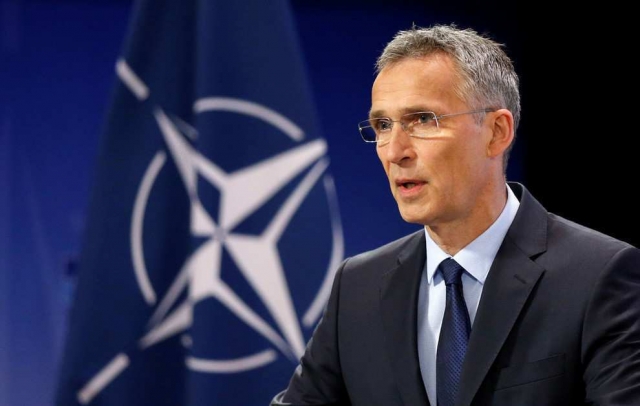Stoltenberg: NATO Needs to Be More Global & Cooperate with Partners like Georgia
NATO Foreign Ministers met virtually on Tuesday (1 December) to discuss key issues for the Alliance. They include an outside expert panel report on how to further adapt NATO for the future, Russia’s military build-up, and NATO’s training mission in Afghanistan.
"We have just concluded the first session of this meeting of NATO Foreign Ministers. We had a good, constructive exchange, snd I am looking forward to when I can once again welcome all the ministers here in Brussels, in person," ," stated NATO Secretary General Jens Stoltenberg following the first day of the meetings of NATO Ministers of Foreign Affairs. "We discussed NATO2030 and how to further adapt our Alliance for the future. We also addressed Russia. And the situation in Afghanistan.
"NATO supports the Afghan peace process. And as part of that, we have adjusted our presence. While United States has decided to further reduce its troop numbers to 2,500, NATO’s training mission continues. And over half of our forces are, now, non-US. Ministers made clear that all Allies remain committed to the mission. And to supporting Afghan security forces in the fight against terrorism. As we continue to assess the situation in Afghanistan, it is clear that we will face a turning point early next year.
"If we stay, we risk continued fighting. And an even longer-term engagement. If we leave, we risk Afghanistan once again becoming a safe haven for international terrorists. And the loss of the gains made with such sacrifice.
"So there is a price for staying longer. But there is also a price for leaving too soon. We will have to take some hard decisions when NATO defence ministers meet next February. But whatever we decide, we must do it in a coordinated and orderly way.
"We also discussed Russia’s continued military build-up in our neighborhood. As well as arms control. We see Russia violating and undermining treaties. And deploying new weapons. Ministers expressed support for preserving limitations of nuclear weapons. And for developing a more comprehensive arms control regime. We all know that the New START treaty will expire next February, so time is running out. We welcome the dialogue between the United States and Russia to find a way forward. Because we should not find ourselves in a situation where there is no agreement regulating the number of nuclear warheads. We are adapting NATO’s deterrence posture to address Russia’s destabilizing actions. At the same time, we all agree that we must continue to pursue dialogue with Russia.
"We also addressed the situation in the Eastern Mediterranean. Working together here at NATO, we recently developed a military de-confliction mechanism between Greece and Turkey. A hotline between the two Allies. And the cancellation of specific military exercises. I am committed to strengthening this mechanism further, to build more comprehensive confidence-building measures.
"We also discussed the NATO2030 project on how we can make our strong Alliance even stronger. Earlier this year, I appointed a group of experts to support my work on NATO’s continued adaptation. The group, led by co-chairs Thomas de Maizière and Wess Mitchell, has now finalised its work. Today the co-chairs briefed Ministers on their findings. And we have just made their report public. I want to thank all the members of the group for their efforts and dedication.
"Their report shows that NATO is agile. It recognizes that in recent years we have been able to adapt, both militarily and politically. The report also demonstrates that political consultation and decision-making work at NATO. So we build on solid foundations. he group’s work concludes today, and is one input into NATO2030.
"I will continue to consult with civil society, parliamentarians, young leaders, the private sector, and of course with Allies. I will then prepare my recommendations for NATO Leaders when they meet next year. The goal is to keep NATO as a strong military Alliance. Make it more united politically. And with a more global approach."
When asked by the Georgian First Channel about the role of the Black Sea region and Georgia in the NATO development strategy, the Secretary General said that by 2030 NATO should become more global and the cooperation with partners, including Georgia, should be part of this strategy.
"One important part of the report is, of course, also to address the fact that we are faced with more and more global challenges. And one of the aims with NATO 2030 is to make NATO a more global Alliance, or at least that we have a more global approach. We should remain a regional Alliance, a North Atlantic Alliance, but we need a global approach, because more and more of the threats and challenges we face are global.
"One of them is the rise of China. And we see that China is coming closer to us, investing heavily in infrastructure in NATO countries, in Europe, also in the Black Sea Region. And, as you know, three Black Sea countries are NATO countries, two are NATO partners, Ukraine and Georgia. And for NATO, we realise the importance of resilience, of protecting our critical infrastructure. And we have developed and we are strengthening our requirements, what we call baseline requirements for resilience, to critical infrastructure, telecommunications, a continuation of government, health, and many other critical services in our societies.
"So, as we adapt, as we change, resilience – protecting infrastructure – will be an important part of that. It’s too early to say exactly how I will reflect that in my proposals for heads of state and government, but I’m certain that resilience, and also the importance of working with partners, will be one of the challenges I have to address when I put forward my proposals," he stated.
By Ana Dumbadze












